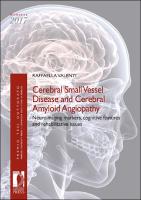Cerebral Small Vessel Disease and Cerebral Amyloid Angiopathy
Neuroimaging markers, cognitive features and rehabilitative issues
Abstract
Sporadic cerebral small vessel disease (SVD) is considered to be among the most commonly known neuropathological processes in the brain, hosting a crucial role in stroke, cognitive impairment, and functional loss in elderly subjects. We investigated clinical (neuroimaging and cognitive) biomarkers in the SVD, through a series of analyses from our five studies. Sporadic cerebral SVD is a complex ‘micro-world’ to be globally considered. All the relevant lesion types and SVD neuroimaging burden should be taken into account. The cumulative effects of microangiopathy burden in the brain of patients affected by SVD are crucial. Cognitive rehabilitation could represent a promising approach to prevent vascular dementia or to improve cognitive performances in patients with cerebral SVD. Longitudinal studies may provide more robust information about the progression and prognostic significance of our findings.


 Download
Download Web Shop
Web Shop